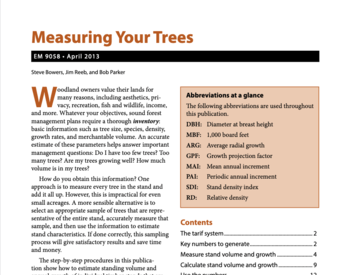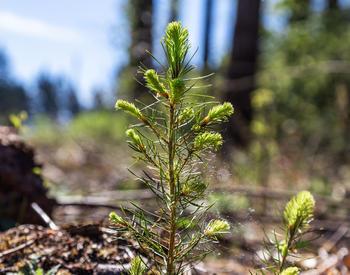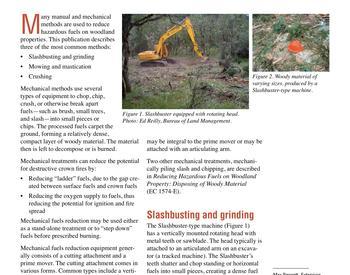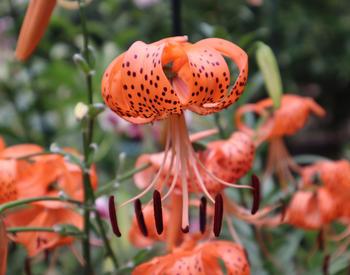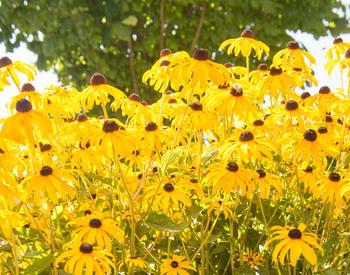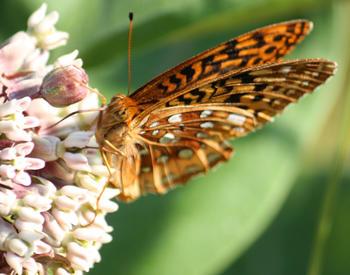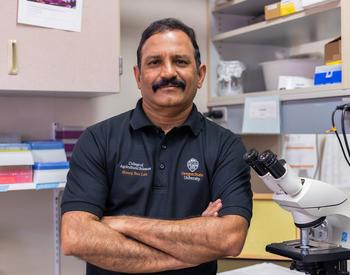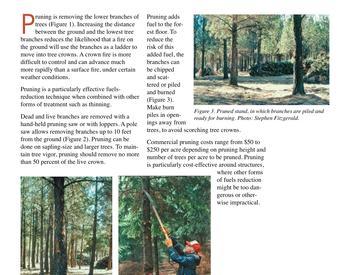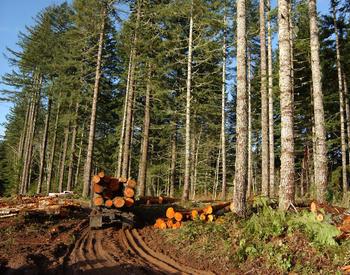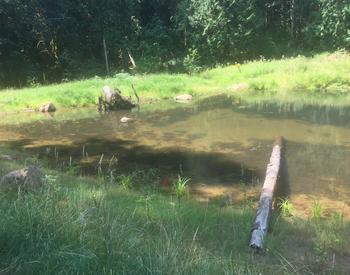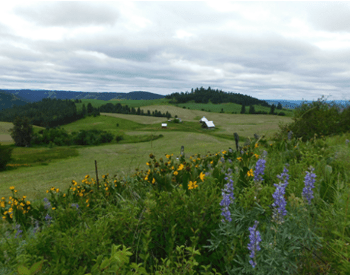Transcript
Speaker 1
From the Oregon State University Extension Service, this is pollination, a podcast that tells the stories of researchers, land managers, and concerned citizens making bold strides to improve the health of pollinators. I'm your host doctor Adoni Malapropos, assistant professor in pollinator health in the Department of Horticulture. This is the last episode of the season and I just happened to be in Lethbridge, AB this week, giving me an opportunity to visit with some very good friends at the apiculture program with Alberta Agriculture and Forestry, Shelley Hoover, Linnea Oving, and Jeff Kearns. And in this episode, we review some of the significant things that happened in APAC. Walter in 2019. I also just want to take this opportunity to thank you for being such dedicated listeners to pollination and it always makes this show so exciting to get feedback from you and get ideas for episodes and guests. I want to wish you all the very best in 2020 and I'm looking forward to a whole new season starting in January. I am in Lethbridge, AB with a cracked team for the final episode of the Year of Pollination. So on my left, I've got.
Speaker 2
Jeff Kearns. I'm an apiculture and pollination technician with the government of Alberta's B Health Assurance unit.
Speaker 4
I'm Linnae oving. I'm also a senior technician with the same unit that Jeff is.
Speaker 3
And I'm Shelley Hoover, and I'm the be health assurance unit lead for the Alberta government.
Speaker 1
And we all know each other. we've known each other for a long time. And so This is why I think I came all the way from Oregon to Lethbridge.
Speaker 3
Just for lunch.
Speaker 1
Just to for lunch for this episode because I thought it was very important to bring this group together to sort of think about the big things that happened with bees, and we're going to focus mostly on honey bees today. But over the last year of 2019. And I think the first question that I wanna ask you all this was the year of April. Mondia was a big thing in Canada was our second, Apple money that we ever had lots of American beekeepers came up. But it's just the biggest event keeping Congress. And I just want to ask each of you, and I'll think about what my answer is, what was sort of the highlight. What was the highlight of April Monday for you? What do you what sort of sticks in your? Mind is something you remember.
Speaker 4
Other yeah, other than Adonis, orange pants once more, he's always representing the OHSU gene Robinson's keynote address on the evolution of youth sociality in honey bees was I was totally riveted. I didn't even think I was interested in that area, and it was just amazing.
Speaker 1
And he's been doing work on this topic for a long time and I missed it. The so give me the what was sort of the. I think it was downstairs talking to somebody. What? What was sort? Of the highlights for you I.
Speaker 4
Think it was there's certain bees that when you put them into these little arenas that they do to do. Assays for a. Variety of things. There are just certain bees that completely ignore the stimuli and what they actually found out was that the genes that were turned on and those bees were actually similar to the ones. In autism, which is. An amazing link. Yeah. And they had they used a variety of controls for that study that where he explained very well. But it was just, I think the other thing was that he works in such an interesting lab where there's no barrier like universities, there's no traditional barriers between the various labs studying different species. So every day they're working with people who study zebrafish or, you know, Drosophila or whatever, like they. So they it's not as differentiate.
Speaker 1
I imagine that the real tradition out of that lab as well as they're really kind of well-designed experiments. They're really kind of, they get to the meat.
Speaker 4
Of things, by the end of it and a lot of other things too, I think he had an hour which everyone else set up. On Monday I had 15. Minutes. So you really got to. Just be really impressed.
Speaker 1
How about you, Jeff? Was there something that Avandia that because you were working, you were a voter?
Speaker 2
I spent most of my time behind the volunteer table, but some of it was really great to see. Many beekeepers from British Columbia and other parts of the country that I hadn't seen for a long time. It was kind of a homecoming and reunion and also felt a bit like a fanboy because there was a. It was like the beekeeping All-Stars walking back and forth across throughout.
Speaker 1
Building it was, it was. It was really remarkable that there were just a lot of people there who were from all over the world too.
Speaker 2
Yes, all over the place. I was really impressed with the people from Chile. I got to do a tour with them because there's a rooftop garden in the operation at the Palate of Congress in Montreal. And the Chileans were just. Their group was. Full of life and very a lot of colorful characters. They are very lively.
Speaker 1
Group so and they're and they. At the time, I guess we probably didn't know, but they were successful, they were successful not for not the next April Monday in Russia, but the one after the next one that's going to be in America is going to be in Chile.
Speaker 4
Yeah, 2020.
Speaker 1
2023 Shelly what were your highlights?
Speaker 3
Well, I have to admit that one of my highlights was actually having it over. Because I was on the organizing committee. So not having any more responsibility was a nice thing. I also went to the COLOSS meeting before Apimondia and that was really sort of more into the meat of some of the science and some of the planning. And I'd never been.
Speaker 1
Koloss what is?
Speaker 4
Two of them.
Speaker 3
That Koloss is the colony loss.
Speaker 1
Is it international? It's a. Big but.
Speaker 3
It's a big European-centered crew.
Speaker 1
I know, I know. Their symbol is like the. Colossus of roads. It's very big.
Speaker 3
Yeah, the classes are broken. They're trying to sort of expand their network into, say, Asia, Oceania, North America, and South America and try and sort of build on those relationships that they already have in Europe. They produce some of those great world colony law surveys that you see published. So that was really great. And as I think Jeff said, just catching up with people, you know, or people you know only through e-mail.
Speaker 1
Just back to the call. So the thing that was really interesting to you was just the, the, the, the magnitude of like how people were thinking through colony losses in Europe like there was just a lot of dimensions of it or what was the thing. That's impressive.
Speaker 3
To you, I think just the scale of the effort that they've gone to try and report statistics, I'm calling losses because every country is counting loss in a different way. What's a colony?
Speaker 1
Oh, right.
Speaker 3
What's lost is it, you know, is it something that's not profitable? Is it something that's actually dead? Is it queenless? So even just standardizing what is a lost colony? When do you report it? How many beekeepers do you have to have to report statistics from that particular country? So they've gone to a huge effort. I mean, it's one thing to do it. Across Canada, where we have this huge geography with only 10 provinces, but across all of Europe it's a very daunting exercise to try and even. Produce those statistics.
Speaker 1
And those figures are really important for policymakers when they're thinking about are things working. Our initiatives working OK.
Speaker 3
Yeah, absolutely, yeah.
Speaker 1
What was my highlight of eight points? Because I remember sort of. I was in, I was in some of the workshops and I just like that you could when you had those workshops, you assembled people from everywhere, like you would have people in the room. From different continents, kind of thinking about the same problem and I do actually remember Neil Spack, a beekeeper from Saskatchewan, coming up to him. Buy one of the coffee urns and just talk about how we're all kind of dealing with the same species, even though we're on different. Areas that you could strike up a conversation with, somebody from Ethiopia pretty easily because you had this kind of common. Language I thought was awesome.
Speaker 3
I think Neil could do it.
Speaker 1
That anyway, Neil's pretty good at talking to anybody. He's the friendliest of friendlies. Yeah. OK, well, let's take a quick break, and then we. Come to question #2. It's a little song.
Speaker
Doo Doo Doo. OK, you're on the side.
Speaker 1
OK. And we're back and we were just we were just talking at the break Lenae actually. There, was she. Had two memorable quotes from Apimondia what? Were those two?
Speaker 4
Quotes one which I don't remember who said it, but apparently it was from some old bee researcher from a long time ago. Said bees do nothing invariably. Which I feel like perfectly summarizes the challenges of doing research on bees when you.
Speaker 1
What? What does it?
Speaker 4
Mean like when you have a group of colonies and you think they should be the same experimental unit like dogs that are bred from the same line and.
Speaker 1
They don't behave the same.
Speaker 4
Two of them do something **** eyed and one of them has three Queens and the other one dies of chalk fruit and a mite experiment. Bees do nothing. Invariably, that's a great quote. And then the second was attributed to Marly's buyback. Someone else said it was that colony survival is not healthy.
Speaker 1
Oh, that's a good quote. Right. Because a colony might survive, but it just has all sorts of problems, not as productive. One can't just use it.
Speaker 4
Yes, I think if we want truly healthy bees, there's a lot more than that. They just survive nice.
Speaker 1
Nice, good job gathering those. Yeah. OK, so next. So, this is the next question I have for you guys are are convened round table at the end of the year? Tell me something about bees that you learned this year. That you brand new, that was new to you. Shall you just look ready?
Speaker 3
That might speed on hemo, limb, or not on hemolymph but on.
Speaker 1
The fat bodies. That was pretty remarkable.
Speaker 3
That was. Pretty remarkable, I think, and really, really excellent research too. To sort of. I don't know how to phrase it. But to prove it?
Speaker 1
Yeah, yeah.
Speaker 3
They came at that question from many different directions and to sort of change the paradigm.
Speaker 1
And Samuel Ramsey, is he? Is he coming to Alberta or was he just here?
Speaker 3
He was here last. February poor Samuel Ramsey. He flew into Edmonton, and it was like 40 below and he was in an airport hotel and didn't go anywhere.
Speaker 1
For those of you speakers, potential speakers in America who do get an invite to the Alberta Beekeeping Commission meeting.
Speaker 3
This is the IP meeting in, yeah.
Speaker 1
The February meeting can be cold, but I think we had Ramesh Sahili up here a couple of years ago. And he expressed the, you know, it was a little chilly for him being an Oregonian. But it is a great meeting. There's this great province with a lot of excellent beekeepers. And these are so do not decline. Don't be scared off by Samuels, OK.
Speaker 3
Don't be scared. Yeah. Although I also remember Daniel Downey flowing into a meeting in Winnipeg and she was coming from Hawaii and the airline lost all of her luggage.
Speaker 1
Oh my God, Jeff Whitlock.
Speaker 3
From Hawaii to Winnipeg in January with no luggage, so maybe pack a sweater in you.
Speaker 1
You could probably do it though of all people. Yeah, yeah.
Speaker 3
Carry on she did. She was. She was. Didn't even phase her.
Speaker 1
OK, great. So, the fat body might throw. Might be on a fat body not just entirely on hemolymph? This is as big.
Speaker 3
And I think that has big implications for how we go about managing.
Speaker 4
Recently put together. Was that our AG? Is that it really has a lot to do with the winter bees because the winter bees have increased fat stores, so if they're being fed upon by bromides, you're going to get these really substandard winter bees. And particularly up here, that has huge implications because we really rely on that generation.
Speaker 3
That was Megan, wasn't it?
Speaker 4
Yes, someone from Michigan, yeah.
Speaker 1
Megan Milbrath. OK, we've had her on.
Speaker 3
You should give an amazing talk.
Speaker 1
The show previously, yeah. OK, fantastic. We. So that's a great point and it sort of comes back to your quote as well. At the same time, it's like just because of the colony. Doesn't die. It may have reduced fat stores and its survival down. The road will be poor.
Speaker
How much is it?
Speaker 1
The thing you learned about bees this year, for the first time.
Speaker 4
Yes, I had previously known of brow love, but I saw brow love for the first time be Laos. Be laughs is the official thing. Yeah.
Speaker 2
They're on the Zika.
Speaker 1
Mm-hmm. What? Describe what you saw.
Speaker 4
Well, at first glance, particularly if one is someone who needs bifocals.
Speaker 1
And where did you find it?
Speaker 4
You're like, oh. There's bromide on this like same color and the same little brown thing, but once I saw it and it was on a queen and, but once I got closer and like, no, this is wrong. They kind of sit higher and they're not the right shape, but otherwise, I could see how, if you couldn't see very detail, you would definitely think they were the same thing and they also move a lot. They move quite quickly, whereas broa tend to. Like staying in place.
Speaker 1
But it's the same color and rough size. Yeah, I'll be darned. And what did? Did you look into what they do?
Speaker 4
They are damaging or people have always said they're kind of benign and I had also heard in the past that you just treat for mites and will kill them. That turns out not to be true.
Speaker 1
Oh, because you had a mite treatment. In and they were still.
Speaker 4
Well, I was talking to Rob Curry about this, and he said they got them in four years ago at the EU of M Mayberry. They're still there.
Speaker 1
So, this is Rock Curry at the University of Manitoba, and so he had, he's got an active colony going in his.
Speaker 4
Yeah, yeah.
Speaker 1
Colony. Nice. OK.
Speaker 4
Yes, yes, but they don't seem to really cause too much damage.
Speaker 1
OK, Jeff, you're up.
Speaker 2
For me, it would have been queen-rearing. We've done some smaller queen-rearing projects in the last few years, but this year we did a much larger version of it, and we went some full on beginning to end so. Doing the grafting and having cell builders and cell finishers and all the interesting cases that go on in there, was the thing that stands out.
Speaker 1
For me this year, you know, I saw when I was up here in. When I was up here in February, I. Was at the. March at the meeting here in Brooks. I heard a little bit about this work, which is really intriguing. You guys have been looking at when beekeepers bring these in for pollination, actually using that as an opportunity to make Queens like that, that they're in this hybrid canola seed pollination for a while. And then using it as a. It's a great opportunity. There are lots of drones in the area.
Speaker 2
Yeah, and the canola pollination seed canola, particularly in the pollination fields, there's a large. Contra Nation of. congregation of hives. Someone and I spent a couple of days driving back and forth down dirt roads, mapping out all the colonies within 10 square kilometers of where we put our meeting. Whoops. And do you remember how many 4000 colonies? So that's a lot of drones inside.
Speaker 4
4000.
Speaker 2
4000 colonies.
Speaker 1
Wait a second. We talked about this in the. Episode with Shelley Hoover. Which you can hear in more detail. Thanks for the tip. OK, let's take a quick break. We'll come back to our last title. Hey, OK, we're back. So. Shelly, what was the kind of big story for you in 2019? What was one of the things that? Sticks in your mind have.
Speaker 3
Happened this year. Well, part of my job is also regulations and policy and so on. A pretty big deal for us in Western Canada is the detection of Asian Hornets in British Columbia, both on Vancouver Island and now recently on the mainland. So, this is Vespa mandarina EA and it's a wasp that will actually eat bees and can kill colonies. So, it's a pretty important bee predator in some parts of the world. Comes from Asia. And so that's something we're going to be watching really closely.
Speaker 1
We take detection. Do we have a sense of how established it is? Is it? Is it spreading? What do?
Speaker 3
We know we know for certain that they found two colonies, one on the island and one on the mainland, and those were both killed. But we don't know how established the population is in British Columbia.
Speaker 1
And I did see something from Washington. I have to confirm this. It was in my Box, but Washington State Department of Agriculture, I think there might have been a detection there. So, this is really a story for the Pacific Northwest, but also the West coming into Alberta and inland into Idaho.
Speaker 3
Right. And interestingly, they've also had detections at airports, too. People deliberately bring in the brood as a medicine.
Speaker 1
You're joking. Oh, no. OK. All right, folks. So, I think that's one thing for 2020 to keep your eyes out for. And I think the Department of Agriculture is going to certainly notify people beekeepers should keep their eyes peeled for these, these Wasps.
Speaker 3
Yeah, no.
Speaker 1
Lenae, what is your?
Speaker 4
Yes, my big thing is honey adulteration. I think it's been creeping up for a number of years now. But there's just so much more aware of it. In 2019, in particular, the CFI did a study on Canadian honey on the shelves and a large proportion of them. Were adultery. Imported honey on Canadian shelves. Yeah, and rice. Syrup seems to be a big problem.
Speaker 1
Oh, so these are people who are adding cheap sweeteners into things that are labeled as honey brings down their costs. But then they make more. Profit, but they've. It's not honey.
Speaker 4
Yeah, no, definitely not, honey. And it's also really part of the reason that honey prices are not recovering in Canada as well. So, but. Our Canadian honey seems to be fine, and Jeff can talk more about some of the honey problems at the honey.
Speaker 2
Awards, beekeeping awards, and beekeepers from all over the world. Submit honey samples and other things like that.
Speaker 1
About this.
Speaker 2
During Chelsea, she had a chance to act as a. Guard at the World Beekeeping Awards because the judges were doing their thing, and the public wasn't allowed to go in, and it was quite exciting. You wouldn't think you would think it would be just a very sedate atmosphere, but people were being very heated. 1 Gentleman was yelling and had to be escorted out of the building by security. But. How it? What was going on is about more than 40% of the honey submitted for judging was disqualified from the from competition for various reasons. Based on the results of. Those tests.
Speaker 1
OK. I guess mine. I was thinking we were the real honeybee-focused panel. And so, I'm going to stay on the honeybee focused because the thing I was really shocked about was this year and I know it's an issue that happened right across the border, right across the US as well as European foulbrood. I think I was doing a trial in Oregon looking at colonies coming into blueberry pollination, leaving blueberry pollination and just seeing the level of European foulbrood in the colonies after they left. Was shocking to me and I guess. Similar things have happened here in British Columbia, and it's Sarah Woods, right at the University of Saskatchewan, who's been looking at the difference. Types of the little there seems to be something going on genetically. Do you know much more about that, Shelley?
Speaker 3
No other than we're seeing some of the atypical bacterial strains, but it's also not clear how these atypical strains perform in terms of their symptom. Symptomology is in actual colonies, so I think that's something that we need to look at.
Speaker 1
At more, I know there's been similar. Meghan Milbrath Ton in Michigan has noticed a very similar thing going on.
Speaker 3
Yeah, East and West Coast, Canada, and the US.
Speaker 1
All right, you guys. Well, thank you so much for taking the time and we'll we're settling our bill and we're off to 2020.
Speaker 3
Thanks for coming.
Speaker 1
To visit us with the Lethbridge unit. Here at. Thank you so much for listening. The show is produced by Quinn Sin and Neil, who's a student here at OSU. The new media communications program, and the show wouldn't even be possible without the support of the Oregon legislature, the Foundation for Food and Agricultural Research, and Westerns there. Show notes with links mentioned on each episode are available on the website, which is. At tower nation. Broadcast.oregonstate.edu I also love hearing from you, and there are several ways to connect with me. The first one is so you can visit the website and leave an episode-specific comment. You can suggest a future guest or topic or ask a question that could be featured in a future episode, but you can do the same things on Twitter, Instagram, or Facebook by visiting the org of B project. Thanks so much for listening. See you next week.
What happened in 2019 when it came to Apiculture? We visit the Apiculture unit at Alberta Agriculture and Forestry in Lethbridge to find out. Hear about highlights from Apimonida, the introduction of an Asian giant hornet in Washington and BC and problems beekeepers have been having with European foulbrood. We are joined by Shelley Hoover, Jeff Kearns and Lynae Ovinge.


